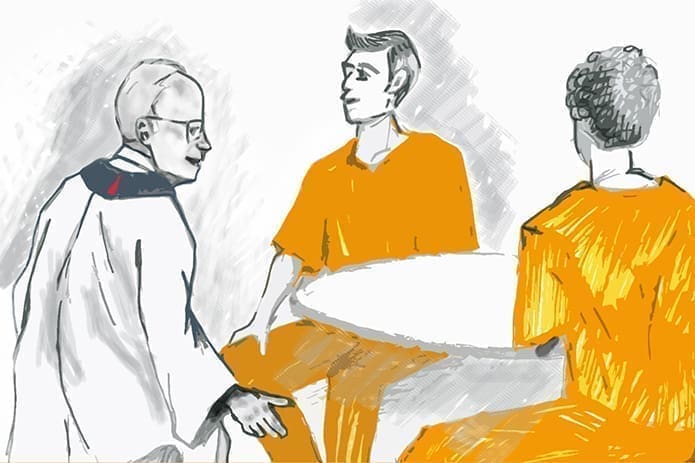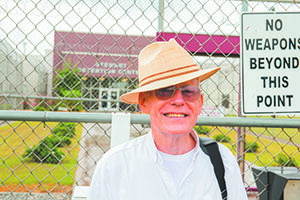 Illustration by Katie Walker-Mai
Illustration by Katie Walker-MaiLumpkin
Father Clif’s ministry is out of sight
By MICHAEL J. JOHNSON, Special to the Bulletin | Published June 10, 2010
LUMPKIN—The phrase “out of sight, out of mind” might apply to the Stewart Detention Center (SDC) a monolithic fortress-like building surrounded by razor wired fencing, tucked away off of a rural road 40 miles south of Columbus, on the western border of Georgia. The facility is said to be the largest structure and employer in the town of Lumpkin, whose population is about 2,700 citizen souls.
An additional 1,100 undocumented souls reside inside Stewart Detention Center, about four miles from Snooky’s restaurant on Main Street and the Stewart County Court House on Lumpkin’s town square. Stewart Detention Center is one of the largest detention centers in the United States for undocumented men.
For Father Clif Marquis (“Call me Father Clif,” he says) those 1,100 souls are in his sight every week and almost always on his mind. Three times a week he ministers to the men detained at the facility, making the drive from his home in Alabama to the detention center to celebrate Mass on Mondays and Wednesdays, and hear confession on Sundays.

Father Clif Marquis outside Stewart Detention Center in west Georgia, where he volunteers three days a week, celebrating Mass and hearing confessions from detained undocumented men. Photo By Michael Johnson
Father Clif, a Missionary Servant of the Most Holy Trinity, is in retirement after four decades of active ministry, including about 12 years in prison ministry. He is quick to point out that the men at SDC are not prisoners—they are detainees. He began working with the men at the SDC in 2006 while in active ministry, and continues in his retirement as a volunteer.
No cameras or recording devices were allowed inside the detention center during a Diocese of Savannah staff visit on Wednesday, Aug. 14, to witness and participate in the celebration of the past Sunday’s Mass—the 19th Sunday in ordinary time. Father Clif and guests arrived at the detention center during staff shift change and waited to be admitted through the main gate as dozens of employees of Corrections Corporation of America (CCA) passed through the “man trap” gate system in groups of two and three. CCA owns the facility and manages it under contract with the federal government.
The spry 72-year-old priest sported his trademark wide-brimmed straw hat rakishly askew and smiled as one of the many guards walking past called out a nickname and gave him a friendly hug. Father Clif seemed well liked by the many employees who greeted him by name.
Father Clif is endeared to the men detained at Stewart Detention Center. His mission is the same as it might be with any parish—ministering to the people’s spiritual needs. He says there are blessings there.
“You’re looking at men who are not bad people,” said Father Clif. “The majority are people who were working (before they were detained). In Mexico the pay is $5 a day. At the end of one day (working in the U.S.) he has 12 days’ pay. That’s why it is worth the risk.”
The vast majority of the men in the Stewart facility are originally from Central or South America (nearly 99 percent, according to the most recent data available). Father Clif said most were detained in Georgia, Alabama and the Carolinas and have family in the United States. Most of the men will be deported to their country of origin within about five weeks.
The detention center houses three general categories of detained people; their status is identified by the color of the jumpsuit they wear. Men wearing navy blue are undocumented people who have been charged with no other infractions. Most of the men in the center wear orange jumpsuits. These are men who have been transferred in from city or county jails, after being arrested or detained for “lots of things that begin with a traffic stop” or other misdemeanor-level incidents. A very small percentage wear red jumpsuits, denoting that they are convicted felons coming out of federal or state prisons. They have “done their time and are about to be deported,” said Father Clif.
The men attending Mass were predominately Spanish speaking, from countries where 70 percent or more of the population is Catholic. “Many come to Mass (initially) because it is the only thing that’s familiar to them,” said Father Clif. “They begin to question ‘What kind of man am I, what kind of dad, what kind of son?’ It’s a privilege (for me) to be there because you’re witnessing an actual conversion moment.”
Confession is “a major part of the ministry” for Father Clif. “Most of the men here have been working 12 hours per day since age 13, and most are in their thirties. For many it’s the first time in their lives they’re not working. It is time to reflect.”
Each confession lasts about one hour. At first Father Clif could hear ten confessions a day. “It’s very tiring,” he said. “About four hours is what I can do for confession at this point.”
In preparation for Mass, Father Clif wheeled a portable podium down the corridor through four large barred gates to the cafeteria where he celebrates Mass on Mondays and Wednesdays. The podium’s cabinets hold the priest’s vestments and the linen and vessels for the Mass. It also holds photocopies of the bilingual liturgy used at every service.
As Mass time neared, detained men were led into the cafeteria by guards. Attendance at the Mass is voluntary. Mass began with a song in Spanish led by Father John Brown on guitar.
Members of the detainee congregation participated as lectors. During Father Clif’s homily, heads turned to watch him as he moved among the metal tables and stools bolted to the floor that served as pews for this Mass. As he walked among the 47 people present, he placed a hand on the shoulder or back of each man that he passed.
“When you’re inside, no one touches you nicely,” he said. “These are lonely people.”
Most men knelt on the concrete floor with heads bowed and hands clasped in prayer during the consecration of the host and the wine.
Almost all of the men formed a line to receive a blessing from Father Clif during Communion. Father Clif, who has difficulty standing for long periods, leaned against a railing and laid his hand on the bowed head each man presented. A few of them also received the host from communion minister Susan Sweet, visiting as part of the Diocese of Savannah group. Only the priest is allowed to consume the wine at Mass in the detention center.
Following Mass, about half of the detained men lingered to shake Father Clif’s hand or embrace him, and exchange a few words before the waiting guards escorted them out of the cafeteria.
While Father Clif has a strong opinion about U.S. immigration policies and practices, he noted that his role is direct ministry, rather than advocacy. “If you do direct ministry, you can’t do advocacy. Don’t prostitute the ministry,” he said.
Following his own advice, Father Clif is giving his life in direct ministry to those souls otherwise of sight at the Stewart Detention Center.
Robin Wright Gunn, Barbara D. King and Katie Walker-Mai contributed to this story. Reprinted with the permission of The Southern Cross, Diocese of Savannah.